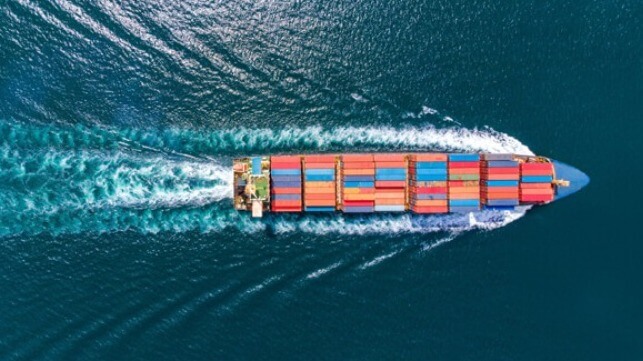IMO: Containerships Could Reduce Emissions with Just in Time Arrivals

Shipping lines have increasingly understood the benefits of voyage optimization for fuel savings and cost control, but a new report from a low carbon public-private partnership sponsored by the IMO is highlighting the immediate benefits of lowering carbon emissions through what they call “Just in Time arrivals.” By focusing even on a relatively small number of voyages, they highlight that the shipping industry could achieve immediate results in reducing carbon emissions while work proceeds on future technologies and alternative fuels.
Just In Time arrivals allow ships to optimize speed during their voyage to arrive in port when berth, fairway, and nautical services are available. It represents a change in mindset for the industry where many experts point out that captains are judged on the ability to arrive on schedule often causing them to go fast to ensure an on-time or early arrival. However, as fuel costs have risen shipping lines have increasingly adopted voyage optimization programs, and even ports, such as those on the U.S. Pacific Coast, have asked containerships to optimize their voyages to reduce the backlog of ships waiting off the ports and the resulting emissions.
“In fighting climate change, global shipping has a steep mountain to climb, and we need to pull all levers to deliver in line with the Paris Agreement,”?said Capt. Andreas M. van der Wurff, Port Optimisation Manager at A.P. Moller-Maersk and?Chair of the Low Carbon GIA Ship-Port Interface workstream that sponsored the research. “The?study underlines that?while we work to accelerate and scale the availability of the future green fuels,?in the short-term significant emissions reductions can be achieved by bringing vessels, terminals, and ports together to exchange standardized data and facilitate Just In Time arrivals.”
The research highlights that containerships can reduce fuel consumption and resulting carbon dioxide emissions by up to 14 percent on a per voyage basis using JIT arrival. The results show that while optimizing speed over the entire duration of a voyage offers the greatest saving opportunity, there are also benefits (5.9 percent) if a vessel optimizes speed over a 24-hour period or even benefits (4.2 percent) produced over a 12-hour period. “This indicates that implementing JIT over the last 12 hours of a voyage can already greatly contribute to fuels and emissions savings,” the report concludes.
The analysis also shows that 50 percent of the potential fuel savings could be achieved by focusing on a comparatively small subset of voyages (8.5 percent for total voyages, 6.5 percent for the last 24-hours, and 3.2 percent for the last 12 hours). According to the authors of the research, these voyages are “potential candidates for first movers,” under the approach providing the industry the opportunity to create immediate reductions in emissions.
“Results in this study demonstrate that operational changes to industry practices, to effectively implement JIT can result in significant fuel consumption and thus CO2 emissions savings,” the report concludes.
The research was conducted by MarineTraffic and Energy and Environmental Research Associates using AIS data comprising 339,390 voyages of containerships in 2019. They calculated that the vessels consumed 43.97 million metric tonnes of fuel and they tested applying the optimization techniques to those voyages. The scenarios looked at total voyage optimization from pilot station to pilot station, as well as using the Just in Time arrival for the last 24 or 12 hours of the voyage before reaching the pilot station. The fuel savings ranged between 1.8 million and 6.2 million metric tons while the resulting CO2 emission reductions ranged from 5.8 million to 19.4 million metric tons.
They conclude the study demonstrates the potential to produce significant savings through implementing the optimization strategies. However, to realize these savings they note that collaboration between shipping lines, ports, and terminals will be required to optimize voyages and properly implement JIT arrivals.
While saying it is clear that the earlier a ship can take action to optimize speed, the greater fuel consumption potential savings, they also call for additional research to support the implementation of the approach. They also recommend further study on the portion of voyages targeting the small percentage of voyages with the potential for the biggest reduction in emissions.
The complete study is available online from the IMO.
